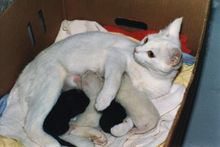[posted by dinah]
This one doesn't get a graphic.
From the opinion section of today's New York Times, "
About Breastfeeding..." If you want to start an argument, mention breast-feeding. A two-year federally sponsored campaign caused a rumpus when it compared a mother who fails to breast-feed with a pregnant woman who rides a bucking mechanical bull at a local tavern, or, in one official's formulation, with a woman who smokes while carrying a child. Recently, a Times article on the campaign incited a new debate that kept the report in the paper's most-e-mailed list for days. While we hesitate to stir things up again, it seems as if this is one issue where the middle ground makes the most sense. The original article,
Breast Feed or Else, by Roni Robin, was published on June 13th and states:
Ample scientific evidence supports the contention that breast-fed babies are less vulnerable to acute infectious diseases, including respiratory and gastrointestinal infections, experts say. Some studies also suggest that breast-fed babies are at lower risk for sudden infant death syndrome and serious chronic diseases later in life, including asthma, diabetes, leukemia and some forms of lymphoma, according to the American Academy of Pediatrics.
Both the original article and the opinion piece it inspired discuss some practical reasons women can't breast feed: the logistics of expressing milk at work, or the mother's inability to produce enough milk to nourish her infant.
From a psychiatric standpoint, breastfeeding is a good thing; it helps with the mother's bonding to the infant while creating an environment of closeness, warmth, nourishment, and comfort-- what could be better?
Neither article, however, mentioned what happens when a mother must take medications. The trend is to not only encourage mothers to breastfeed, but to demand it, and now to create the dictate that to
not breastfeed is yet one more form of (granted, not yet indictable: sorry Clink and Foo) child abuse. The issue comes up in psychiatry over and over again in the treatment of
Post-partum depression. In this condition, the depressed mother is already questioning her competence, she is prone to feelings of guilt, she may be struggling with remorse and distress if there was a separation due to her psychiatric hospitalization, and she may well need to be treated with medications. The last thing she needs is to hear she's harming her infant by not breastfeeding and that her inability to do so is akin to exposing her neonate to cigarette smoke or riding any kind of bucking broncho thingamajiggy.
While one jury's still debating the precise wonders of breastfeeding, another is debating the safety of exposing neonates to psychotropic medications via breast milk. I won't go into those studies here-- most of them look at the immediate effects, or those effects that occur up to age 2 so even if it's found to be safe, the utility of these studies is limited: I want to know how the exposed infants are doing at age 20.
Maybe we will find that early exposure does good things for the infant, maybe it will protect against future episodes of mental illness in a new human being who is already at increased risk (remember, this is my rambling, there is no evidence at all anywhere that this is the case!), maybe we will some day realize that prozac should be in the water supply. In the meantime, however, I'll continue to assume that psychotropic meds might do harmful things to the developing brain. Most of the women I see have stopped nursing before they've crossed my threshold-- it's just been too much to handle in their compromised state. All of them feel guilty. And while I agree that breastfeeding is the ideal, our worlds aren't always ideal or anywhere near it, and I'm left to say that generations of people were raised on formula and people turn out as they will. Zooming asteroids, terrorists, bird flu, and all those known & unknown toxins we drink and breathe, mostly we're just doing the best that we can in a world with no guarantees.
In case I messed up the links:
post partum depression:
http://www.womenshealth.gov/faq/postpartum.htmBreast Feed or Else: http://www.nytimes.com/2006/06/13/health/13brea.html?ex=1151985600&en=4bd49310078f89a1&ei=5087%0AAbout Breastfeeding from today's opinion section:http://www.nytimes.com/2006/07/02/opinion/02sun2.html
 |
| [Pic per ClinkShrink] |



